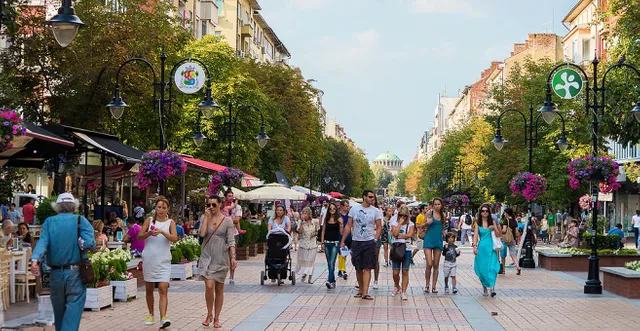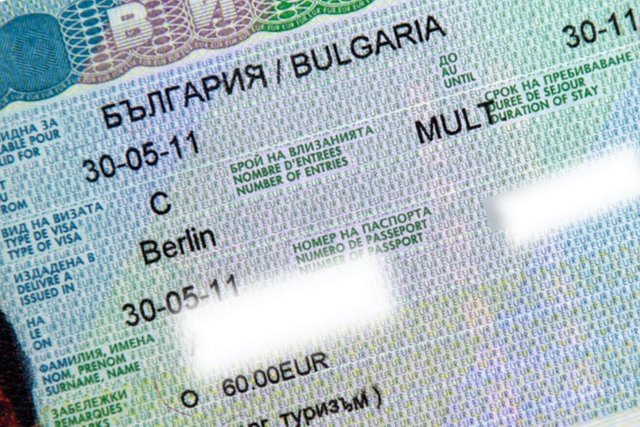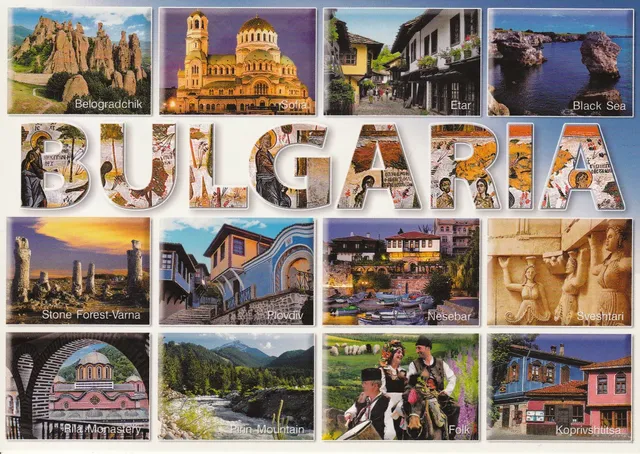How to Be a Digital Nomad or Remote Worker in Bulgaria: The Ultimate Guide
If you’re a digital nomad or remote worker dreaming of Europe, Bulgaria should be on your radar. Tucked away in Southeastern Europe, this hidden gem combines history, nature, and modern amenities—all at a fraction of the cost you’d find in Western Europe. As someone who’s spent years exploring Bulgaria, I can confidently say it’s a paradise for digital nomads. You get to work in a country that offers stunning landscapes, from the snow-capped peaks of the Rila Mountains to the golden beaches of the Black Sea. But beyond the tourist attractions, Bulgaria offers a unique opportunity to settle in as a remote worker thanks to its growing infrastructure, affordable lifestyle, and increasingly digital-friendly environment.
What makes Bulgaria particularly exciting is its mix of the old and new. On one hand, you can walk through ancient Roman ruins in Plovdiv or get lost in the cobbled streets of Veliko Tarnovo. On the other hand, modern Sofia is filled with coworking spaces, fast Wi-Fi, and a growing startup culture. Plus, thanks to Bulgaria’s strategic location, it’s easy to explore neighboring countries like Greece, Romania, and Turkey when you need a change of scenery. Whether you’re into hiking, beach lounging, or history hunting, Bulgaria offers a work-life balance that’s truly unmatched.
What I love about Bulgaria is that it’s a country in transition—combining the charm of its rich history with a rapidly growing tech ecosystem. Remote workers can enjoy fast internet, plenty of coworking spaces, and, best of all, a lifestyle that lets you stretch your budget while living comfortably. But let’s dive deeper into what makes Bulgaria such a perfect destination for digital nomads.
Infrastructure for Digital Nomads in Bulgaria
One of the most critical things to consider when working remotely is infrastructure, and Bulgaria delivers in spades. Internet speed, coworking spaces, and accessibility are all essential when you need to stay productive while working from afar. Thankfully, Bulgaria boasts some of the fastest internet speeds in the European Union, consistently ranking among the top countries for internet quality. Whether you're in the capital city of Sofia, along the scenic coast in Varna, or even in smaller towns like Veliko Tarnovo, you'll have no trouble staying connected.
In Sofia, which is the country’s digital nomad hub, you’ll find a range of coworking spaces designed to cater to remote workers. Spaces like Betahaus, Work & Share, and Puzl have become hotspots for freelancers, startups, and digital nomads. These spaces aren’t just about a desk and Wi-Fi; they offer a community where you can network, collaborate, and learn from other professionals. Plus, the cost of a coworking pass is significantly lower than in Western Europe. You can expect to pay anywhere from €80 to €150 per month, depending on the location and amenities.
For those who prefer a more flexible work environment, many cafes across Bulgaria are remote worker-friendly. Sofia’s Dabov Specialty Coffee and Chucky’s Coffee House are two of my personal favorites for getting work done, with strong coffee, reliable Wi-Fi, and an ambiance conducive to productivity. Even outside the capital, cities like Plovdiv, Burgas, and Bansko are quickly adapting to the influx of digital nomads, offering cozy cafes with stable internet connections. In fact, Bansko has become somewhat of a winter destination for remote workers due to its coworking spaces and proximity to ski resorts, combining work and play seamlessly.
Cost of Living in Bulgaria
One of Bulgaria’s greatest draws for digital nomads is its affordability. Compared to Western Europe or even other Eastern European countries, Bulgaria offers a very budget-friendly lifestyle without compromising on quality. Whether you're looking at accommodation, food, transportation, or leisure activities, the cost of living here allows you to save while enjoying a high standard of living.
Accommodation varies depending on the city, but in general, rent is quite affordable. In Sofia, you can find a one-bedroom apartment in the city center for around €300 to €500 per month, while in smaller cities like Plovdiv or Burgas, prices can drop to as low as €200 to €400. If you're staying for the long haul, renting a furnished apartment is straightforward, and landlords are generally accommodating to foreign workers.
When it comes to food, Bulgaria is a haven for foodies. Whether you're dining out or buying groceries, you’ll be pleasantly surprised at how far your money goes. A meal at a mid-range restaurant costs around €10, while a simple meal at a local eatery can be as low as €5. If you’re cooking at home, expect to spend around €30 to €50 per week on groceries. Fresh fruits and vegetables are abundant, especially at local markets, where you can find organic produce at unbeatable prices. For leisure, Bulgaria offers numerous affordable activities, from exploring historic cities and hiking mountain trails to visiting cultural landmarks like Rila Monastery or the Thracian tombs.
Visa and Legal Stay Conditions for Remote Workers
Perhaps one of the most crucial aspects of moving to Bulgaria as a digital nomad is understanding the visa requirements and legal stay conditions. As an EU member state, Bulgaria follows standard EU rules, which means that if you're an EU citizen, you can live and work in the country without needing a visa.
EU Citizens: As noted, EU citizens enjoy freedom of movement within Bulgaria and can stay up to 90 days without registering. If they plan to stay longer, they only need to register their address and apply for a residency permit. No work permit is required for remote work, as long as the work is for clients or employers based outside Bulgaria.
Non-EU Citizens: For non-EU citizens, including Americans, Canadians, Australians, and others, Bulgaria does not offer a dedicated "digital nomad visa" as some other countries do. However, non-EU citizens can apply for a Type D visa, which is typically granted for freelance or remote work purposes. You must apply for this visa at a Bulgarian embassy or consulate in your country of residence. The process includes submitting documents such as proof of remote work, financial stability, health insurance, and proof of accommodation.
Type D Visa: The Type D visa allows non-EU citizens to stay in Bulgaria for 6 to 12 months, with the possibility of extension. To apply, you must provide evidence of your remote work status (such as contracts with employers outside Bulgaria), proof of income, health insurance, and a clean criminal record. Once in Bulgaria, non-EU citizens must register their address within five days of arrival and apply for a residency permit.
Important Considerations: While Bulgaria doesn’t yet offer a formal "digital nomad visa," this Type D visa is a suitable pathway for freelancers or remote workers who want to stay longer than 90 days. It’s important to prepare your documents in advance, and processing times can vary between 30 to 35 business days.
By staying updated and preparing properly, the visa process for non-EU citizens in Bulgaria is manageable, and the country’s affordability and lifestyle make it an appealing destination for digital nomads.
I’ve met several digital nomads who successfully navigated the visa process by consulting with local legal experts or using services specifically designed to help remote workers settle in Bulgaria. It's worth investing in professional assistance to avoid potential headaches and ensure your stay is fully legal.
Why Bulgaria is Perfect for Remote Workers
To wrap it all up, Bulgaria offers an unparalleled experience for digital nomads and remote workers. Its unique blend of affordability, rich culture, and modern infrastructure makes it a standout destination in Europe. With fast internet, a growing number of coworking spaces, and diverse landscapes ranging from mountains to beaches, Bulgaria provides digital nomads with both a productive work environment and a high-quality lifestyle. Whether you want to spend your weekends hiking in the Rila Mountains, sunbathing on the beaches of the Black Sea, or exploring the ancient Roman ruins of Plovdiv, Bulgaria offers a work-life balance that’s hard to beat.
The low cost of living is one of Bulgaria's biggest attractions. You can enjoy a comfortable lifestyle on a budget that would be difficult to match in most Western European countries. With affordable accommodation options, inexpensive yet delicious food, and affordable leisure activities, Bulgaria allows you to save more while still enjoying the comforts and excitement of living in Europe. This cost-effectiveness extends to coworking spaces, where monthly fees are a fraction of what you'd pay in other major European cities, allowing you to work efficiently without breaking the bank.
Moreover, Bulgaria is in the heart of the Balkans, making it an ideal base for exploring other parts of Europe. Its well-connected transport system allows for easy trips to nearby countries like Greece, Romania, and Turkey. Whether you're looking for a weekend getaway or a longer exploration of Europe, Bulgaria's location makes it convenient to travel while still having an affordable home base.
From my own experience, the warmth and hospitality of the Bulgarian people make it easy to integrate and feel at home. The local culture is deeply rooted in traditions, but at the same time, Bulgaria is embracing modern influences, especially in its larger cities. Whether you're interacting with locals in a cozy mountain village or attending a tech startup event in Sofia, you'll find a welcoming atmosphere wherever you go.
For non-EU citizens, while the visa process may seem daunting at first, the Type D visa offers a viable pathway to living and working in Bulgaria. The application process is relatively straightforward, especially if you prepare your documents in advance. Plus, the financial and tax benefits, such as the 10% flat income tax rate, make it an attractive option for freelancers and remote workers looking to minimize expenses while maximizing their experience.
With the right preparation—whether it’s sorting out your visa, finding the perfect coworking space, or adjusting to local customs—Bulgaria can be an ideal base for your digital nomad journey. Beyond its affordability and work-friendly infrastructure, Bulgaria offers a blend of cultural richness, natural beauty, and vibrant urban life that makes it an appealing destination for anyone looking to combine work with adventure. And who knows? You might just fall in love with this country the way I did, and find yourself staying longer than you ever planned.
For more insider tips, in-depth guides, and personal stories about living or traveling in Bulgaria, be sure to check out the Bulgaria Explorer blog, your go-to resource for everything you need to know about this incredible country!




